Photo: Maury Phillips/Getty Images for The Recording Academy
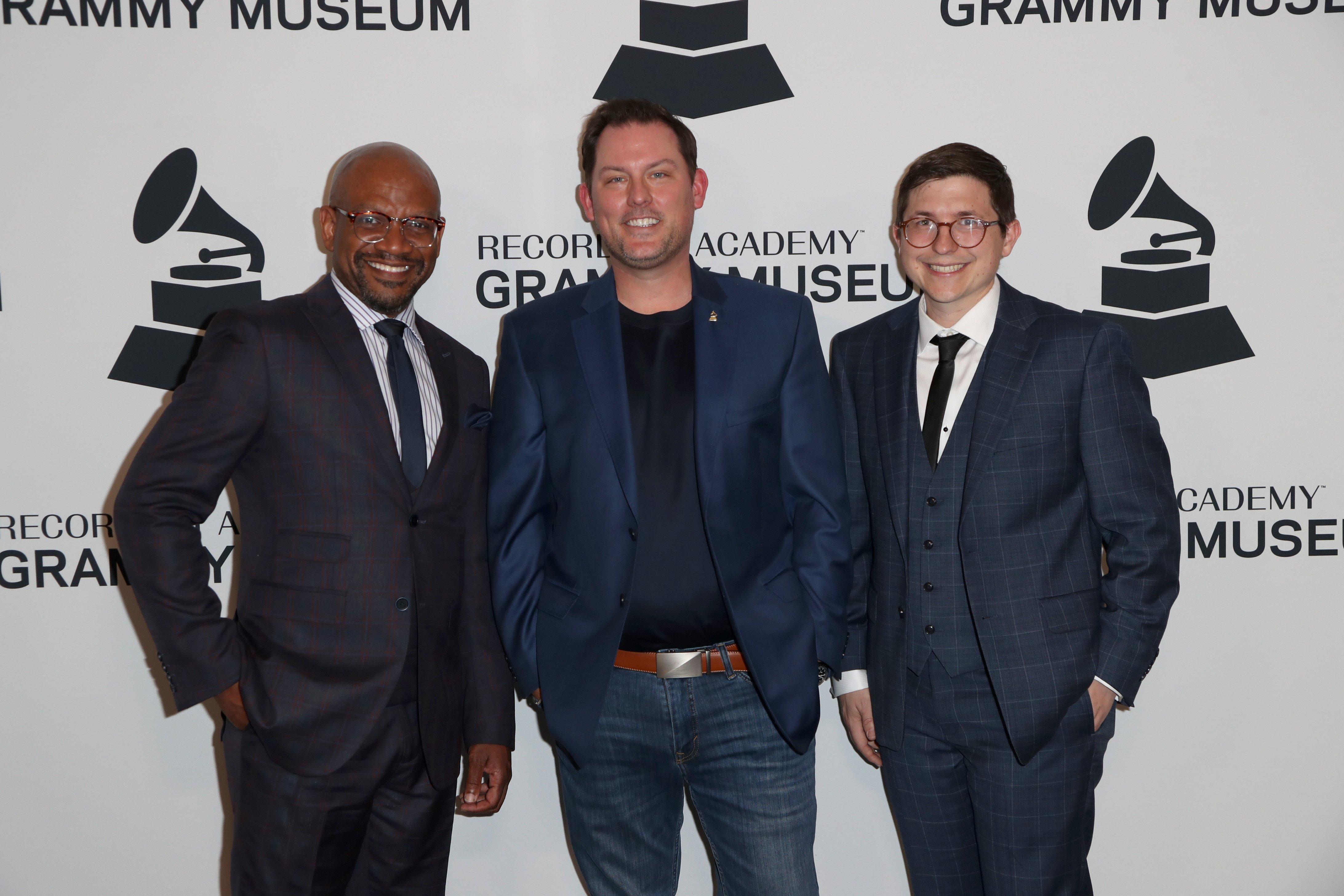
feature
"Teachers & Artists Together Can Inspire The Next Generation": GRAMMY In The Schools Salute To Music Education Honorees & Organizers Share Why Music Education Is More Important Than Ever
The GRAMMY Week event honored Jeffrey Murdock from University of Arkansas and Stephen Cox from Texas' Eastland High School, the respective 2021 and 2022 recipients. Nathaniel Rateliff & The Night Sweats also took the stage for a special performance.
During this year's GRAMMY Week, executives, teachers, and students came together for the GRAMMY In The Schools Salute To Music Education. The evening — a collaborative effort from the Recording Academy and the GRAMMY Museum, presented by MGM Resorts International — celebrated the power of music education.
"Music education is now more important than ever. The GRAMMY Museum's preservation of music is so important — we recognize and honor our history, embrace our present and think toward the future," Valeisha Butterfield Jones, co-president of the Recording Academy, told GRAMMY.com on the red carpet. "When we think about tonight's mission, focus on education, focus on young people, it's all about the future — making sure that young people have a creative outlet, have artistic freedom and ways to express themselves. What better way to heal and unify."
Before Nathaniel Rateliff & The Night Sweats took the House of Blues Las Vegas stage for a special one-hour set, president and CEO of the GRAMMY Museum, Michael Sticka, presented the Music Educator Award to Jeffrey Murdock from University of Arkansas, and Stephen Cox from Eastland High School in Eastland, Texas, the respective 2021 and 2022 recipients.
As Sticka explained, the award recognizes educators who have made a significant and lasting contribution to the music education field, and demonstrated a commitment to the broader cause of maintaining music education in the schools. He added that they receive about 3,000 nominations each year.
Murdock and Cox both received a $10,000 honorarium and matching grant for their school's music program. Every year, nine additional finalists receive a $1,000 honorarium and matching grants. The remaining 15 semifinalists receive a $500 honorarium with matching school grants.
Prior to the ceremony, Murdock and Cox gave GRAMMY.com perspective on how the honor highlights the work they do in their classrooms, and what it signifies to their students.
"Having done this for the last year — going in and out of schools, watching educators — I am keenly aware that there are so many in the trenches everyday leveling the playing field in music education," said Murdock. "I feel like I'm a representative of all of those people who are doing this important work."
For Cox, it's about giving his students purpose. "I come from a little bitty town and a little bitty community — with 4,000 people — and the kids at my school sometimes think, 'We're in a little town, it doesn't matter.' What I hope this means to them, is that they matter," he said. "What I do in my classroom, I do because I think it's right. And I don't think that changes just because of the recognition. What I hope it does for my community, my kids, is that they know that they matter. They don't have to question it. They know that people in small places, small towns, matter."
Murdock said he told his students the award would not change him or what he does. "Students always say, 'You are going to be big time, and you're going to be doing this and that. No, we do the same work every day," he added. "After the award was announced last year, I went right back to my classroom that same day. 'Let's start over, let's continue to do this work.' I want them to know that they, too, can reach the masses and do so in meaningful ways — while not changing who they are," Murdock says.
Those who helped put on the GRAMMY In The Schools Salute To Music Education also spoke on the formative music experiences that impacted their lives and careers.
"In high school, my first concert was the BeeGees. Right before COVID, we had the awards for lifetime achievement and I got to hand the award to the last remaining Gibb," said Tim Bucher, chair of the GRAMMY Museum Board of Directors. "I told him about that story, and he hugged me. It was really cool. I think a lot of kids, when they experience live music, it really inspires them, as well as teachers — so teachers and artists together can inspire the next generation."
Read More: 5 Organizations And Scholarships Supporting Music Education
Sticka shared how he found comfort in music growing up. He hopes to bolster the same kind of support for kids through the many programs the Museum offers.
"Everything from Dolly Parton to Neil Young, I've listened to it all. It's something I've always had a passion for. I've always found a lot of solace in music; working in music is a dream," Sticka said. "We foster the next generation of music creators and leaders through GRAMMY Camp." Through GRAMMY in the Schools programming, workshops and tours, more than 25,000 students come through the museum yearly, Sticka noted. "Hopefully, they all find inspiration throughout that," he added. "They love the workshops and music production."
Butterfield Jones — who can relate to Cox's small-town woes — found solace in Salt-N-Pepa. "I remember at seven years old, listening to one of my favorite songs by Salt-N-Pepa, and feeling like it was an outlet, and a way to escape from a very small country town in Wilson, North Carolina," she recalled. "I remember having big dreams through music and the power of radio — listening to women in hip-hop, with so much freedom, liberated and using their voices so boldly."
Early teaching at home played a pivotal role for Rateliff. "I didn't really have much of a formal education," he said. "My parents were musicians, so I got most of my education and music through them. At a pretty early age, their influence is what made me want to pursue music."
GRAMMY In The Schools Salute To Music Education is just one of the countless ways the GRAMMY Museum shines light on the impact of music, both in and out of the classroom. Looking ahead to the organization's mission for the next five years, Rita George, chief program officer of the GRAMMY Museum, says there will be a continued amplification of the education work being done through the museum.
"We are proud that Billie Eilish and Finneas went through our education programs, as well as Jon Batiste, Maren Morris. They've all been so good to us as we try to work with the next generation of creators and give them a platform and a place to find a community," she said. "The other part is [students] finding a passion, understanding or link to an exhibit — or a music form, production, or a career that isn't just about being the person on the stage. We want to be a resource for students and educators on every level."
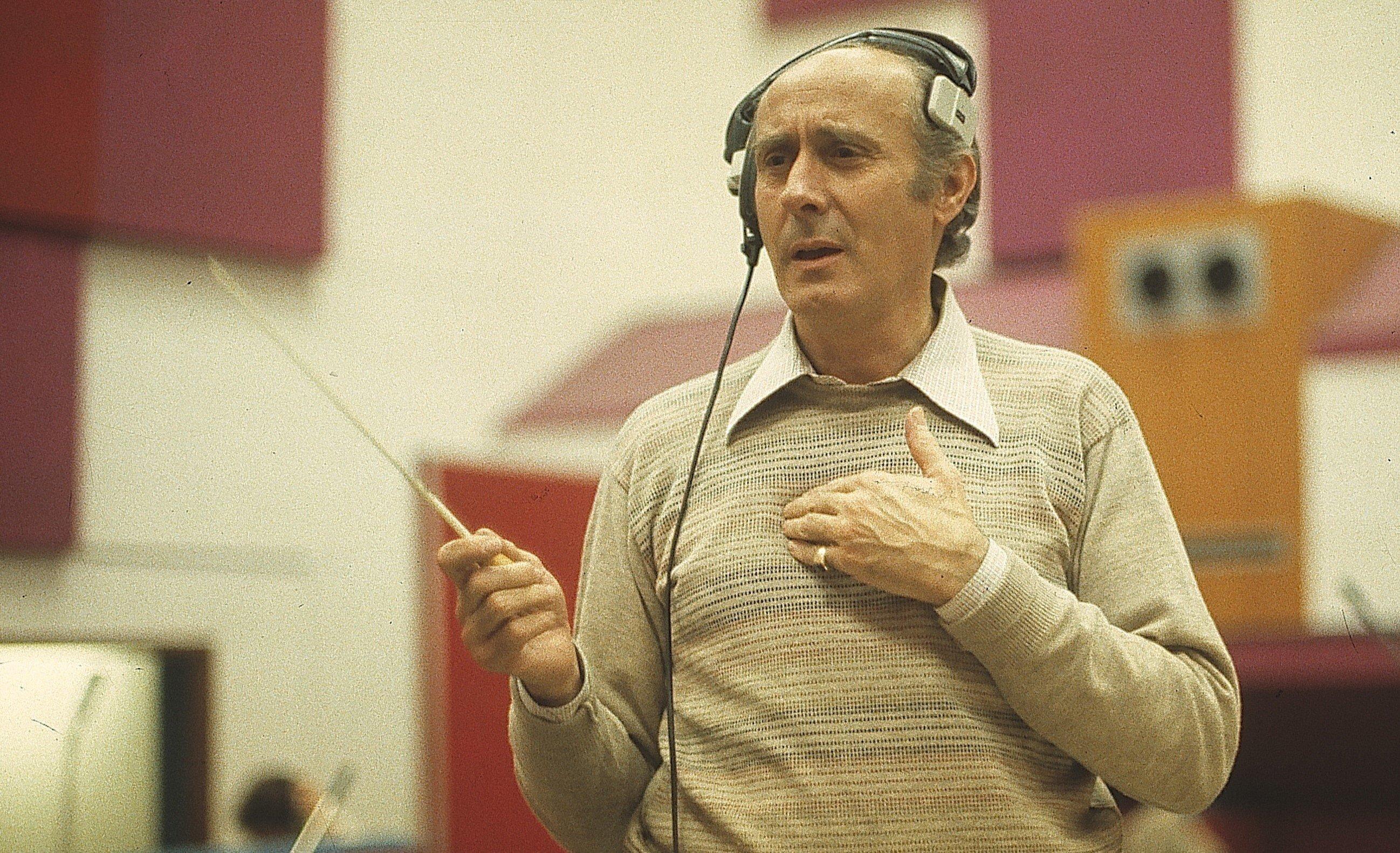
Photo: A. Schorr/ullstein bild via Getty Images
list
10 Essential Henry Mancini Recordings: From "Moon River" To The 'Pink Panther' Theme
Composer, arranger, conductor and pianist Henry Mancini won 20 GRAMMY Awards over his legendary career. On what would be his 100th birthday, revisit 10 timeless Henry Mancini compositions.
Henry Mancini had a gift for melodies of an ethereal, almost supernatural beauty.
His prolific discography — albums of jazzy orchestral pop, dozens of film and television soundtracks — established him as a cultural icon and transformed the role that melody and song played in the art of movie narrative. Once you encounter a Henry Mancini tune, it’s almost impossible not to start humming it.
A composer, arranger, conductor and pianist of tireless discipline, Mancini won a staggering 20 GRAMMY Awards and was nominated 72 times. All of his wins — including the first-ever golden gramophone for Album Of The Year at the inaugural 1959 GRAMMYs — will be on display at the GRAMMY Museum to honor his centennial birthday, April 16.
To mark what would be his centennial birthday, Mancini's children will travel to Abruzzo, Italy — where Mancini’s parents migrated from. And on June 23, the Hollywood Bowl Orchestra will present a program of his music with a gallery of guest stars including singer Monica Mancini, the maestro’s daughter. Out June 21, The Henry Mancini 100th Sessions – Henry Has Company will feature a new recording of "Peter Gunn" conducted by Quincy Jones and featuring John Williams, Herbie Hancock and Arturo Sandoval.
Although Mancini died in 1994 at age 70, his compositions remain timeless and ever-relevant. Read on for 10 essential Henry Mancini compositions to cherish and rediscover.
"Peter Gunn" (1958)
In 1958, Mancini was looking for work and used his old Universal studio pass to enter the lot and visit the barber shop. It was outside the store that he met writer/director Blake Edwards and got the chance to write the music for a new television show about private detective Peter Gunn.
Seeped in West Coast Jazz, Mancini’s main theme sounds brash and exciting to this day – its propulsive beat and wailing brass section evoking an aura of cool suspense. The "Peter Gunn" assignment cemented his reputation as a cutting-edge composer, and the accompanying album (The Music From Peter Gunn) won GRAMMYs in the Album Of The Year and Best Arrangement categories.
"Mr. Lucky" (1959)
Half of the "Peter Gunn" fan mail was addressed to Mancini. As a result, CBS offered Blake Edwards a second television show, as long as the composer was part of the package. Edwards created "Mr. Lucky," a stylish series about the owner of a floating casino off the California coast.
1959 was an exhausting year for Mancini, as he was scoring two shows at the same time on a weekly basis. Still, his music flowed with elegance and ease. The "Mr. Lucky" ambiance allowed him to explore Latin rhythms, and the strings on his wonderful main theme shimmer with a hint of yearning. It won GRAMMY Awards in 1960 for Best Arrangement and Best Performance by an Orchestra.
"Lujon" (1961)
As part of his contract with RCA Victor, Mancini was committed to recording a number of albums featuring original compositions in the same velvety jazz-pop idiom from his television work. "Lujon" is the standout track from Mr. Lucky Goes Latin, a collection of Latin-themed miniatures that luxuriate in a mood of plush languor.
Inspired by the complex harmonics of French composer Maurice Ravel, "Lujon" steers safely away from lounge exotica thanks to the refined qualities of the melody and arrangement.
"Moon River" (1961)
Performed on a harmonica, the main melody of "Moon River" is nostalgic to the bone, but also life affirming. A majestic string section makes the music swoon, like gliding on air. And the harmonies in the vocal chorus add gravitas — a touch of humanity.
It took Mancini half an hour to write "Moon River," but the Breakfast at Tiffany’s anthem made him a global superstar. Among the many artists who covered the song, pop crooner Andy Williams turned it into his personal anthem. Mancini won an Academy Award for Best Original Song, and GRAMMY Awards for Record Of The Year, Song Record Of The Year and Best Arrangement. The album soundtrack earned two additional gramophones.
Theme from Hatari! (1962)
After two failed attempts with different composers, legendary director Howard Hawks invited Mancini to write the score for Hatari! — the wildly episodic but oddly endearing safari film he had shot in Tanganyika with John Wayne. Mancini jumped at the opportunity, and Hawks gave him a few boxes from the trip that contained African percussive instruments, a thumb piano and a tape of Masai tribal chants. Two chords from that chant, together with a slightly detuned upright piano formed the basis for the movie’s main theme.
Mancini’s sparse arrangement and melancholy melody conspired to create one of the most gorgeous themes in the history of film.
"Days of Wine and Roses" (1962)
Throughout the decades, Mancini provided musical accompaniment to Blake Edwards’ filmography, which switched from slapstick comedy to stark melodrama. There is a perverse beauty to the theme of Days of Wine and Roses — a movie about a couple of lifelong alcoholics — as the lush choral arrangement seems to glorify the innocence of better times.
It won an Academy Award for Best Original Song — Mancini’s second Oscar in a row — and three GRAMMYs: Record Of The Year, Song Of The Year and Best Background Arrangement.
"The Pink Panther Theme" (1963)
Directed by Edwards and starring Peter Sellers as part of an ensemble cast, the original Pink Panther was a frothy caper comedy that had none of the manic touches of comedic genius that Sellers would exhibit in subsequent entries of the franchise. It was Mancini’s ineffable main theme that carried the movie through.
Jazzy and mischievous, Mancini wrote the melody with the light-as-a-feather playing of tenor saxophonist Plas Johnson in mind. It won GRAMMYs in three categories: Best Instrumental Arrangement, Best Instrumental Compositions (Other Than Jazz), and Best Instrumental Performance – Non-Jazz.
Charade (1963)
Mancini’s gift for cosmopolitan tunes and jazzy arrangements found the perfect vehicle in the score for Stanley Donen’s Charade — a droll Hitchcockian thriller shot in Paris and starring Cary Grant and Audrey Hepburn.
The main theme is a waltz in A minor, and opens with pulsating percussion. When the central melody appears, it evokes a melancholy reflection and a certain thirst for the kind of globetrotting adventure that the film delivers in spades. It was Johnny Mercer’s favorite Mancini melody, and he wrote exquisite lyrics for it.
The best version probably belongs to jazz singer Johnny Hartman, who released it as the opening track of his 1964 album I Just Dropped By To Say Hello.
Two For The Road (1967)
Friends and family remember Mancini as a humble craftsman who ignored the trappings of fame and focused on the discipline of work. In 1967, after Audrey Hepburn cabled to ask him about writing the music for the Stanley Donen film Two For The Road, Mancini agreed, but was taken aback when the director rejected his initial theme. Leaving his ego aside, he returned to the drawing board and delivered a lovely new melody – and a spiraling piano pattern seeped in old fashioned tenderness.
"Theme from The Molly Maguires" (1970)
Even though Mancini enjoyed most accolades during the ‘60s, his protean level of inspiration never wavered. In 1970, he was brought in to rescue the soundtrack of Martin Ritt’s gritty secret societies drama The Molly Maguires, about Irish-American miners rebelling against their mistreatment in 19th century Pennsylvania.
The main theme makes time stand still: a sparse arrangement that begins with a solitary harp, until a recorder ushers in a haunting, Irish-inspired melody. The score reflected a more restrained Mancini, but was still intensely emotional.
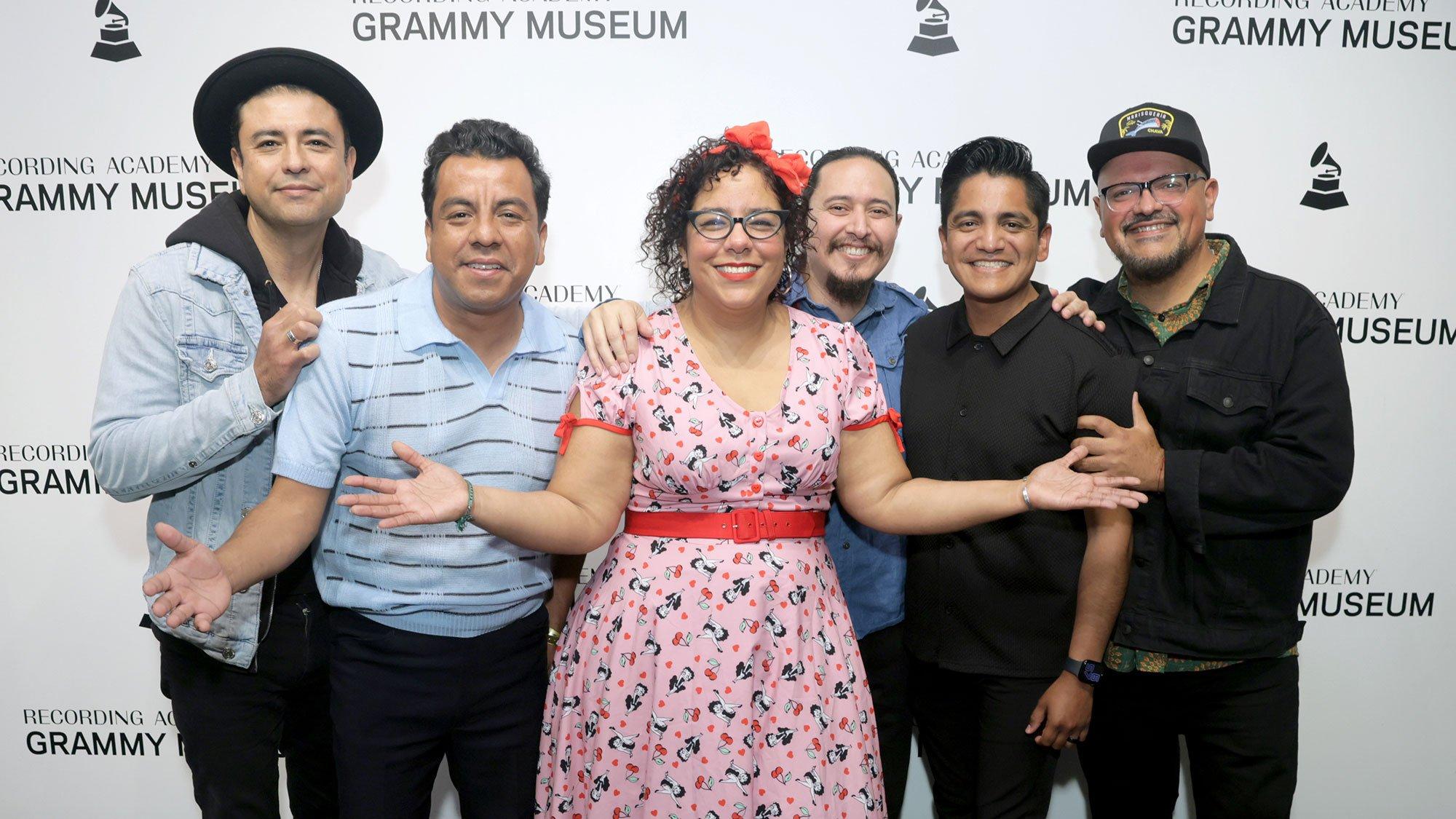
Photo: Rebecca Sapp/Getty Images for The Recording Academy
news
La Santa Cecilia Celebrates Their 'Alma Bohemia' With Documentary Screening & Performance At The GRAMMY Museum
In a documentary screening detailing the making of their album 'Cuatro Copas' followed by a discussion and live performance at the GRAMMY Museum, La Santa Cecilia recounts years of making music and friendship.
"Oh no, I’m going to start crying again," says La Santa Cecilia singer La Marisoul during a touching scene in Alma Bohemia, the documentary directed by Carlos Pérez honoring the Los Angeles band’s 15 year anniversary.
As it turns out, there are many reasons to be emotional about this film — and the very existence of La Santa Cecilia in the contemporary Latin music landscape. Fittingly, Alma Bohemia was received enthusiastically by the capacity audience during an exclusive screening on April 3 at the GRAMMY Museum’s Clive Davis Theater in Los Angeles.
Formed by La Marisoul (real name is Marisol Hernández), bassist Alex Bendaña, accordionist and requinto player José "Pepe" Carlos and percussionist Miguel "Oso" Ramírez, La Santa Cecilia was for years one of the best kept secrets in the Los Angeles music scene. As close friends and musicians, they won over audiences with an organic, down-to-earth sound and a lovely songbook that draws from traditional formats such as bolero, ranchera and nueva canción.
Alma Bohemia follows the making of La Santa’s 2023 album, Cuatro Copas Bohemia en la Finca Altozano. A celebration of the band’s longevity, the session also functions as a subtle, yet powerful musical experiment. It was recorded at the Finca Altozano in Baja California, where the band members stayed as guests of celebrated chef Javier Plascencia — a longtime fan.
Argentine producer Sebastián Krys — the band’s longtime collaborator — calls this his Alan Lomax experiment. The album was recorded live on tape with a variety of strategically placed microphones capturing hints of ambient sonics — a sweet afternoon breeze, the clinking of glasses, the musicians’ banter, the soft sounds that accompany stillness.
From the very beginning, the making of Cuatro Copas mirrors the band’s bohemian cosmovision: A communal approach where the quartet — together with carefully selected guest stars — get together to share the magic of creation, the unity of like-minded souls, homemade food, and more than a couple of drinks. In effect, the bottles of mezcal and never ending rounds of toasting quickly become a running joke throughout the documentary.
La Marisoul’s fragile lament is enveloped in spiraling lines of mournful electric guitars with soulful understatement on the track "Almohada." Guest artists liven things up, with Oaxacan sister duo Dueto Dos Rosas adding urgency to "Pescadores de Ensenada," while son jarocho master Patricio Hidalgo ventures into a lilting (yet hopeful) "Yo Vengo A Ofrecer Mi Corazón," the ‘90s Argentine rock anthem by Fito Páez.
Visibly delighted to be part of the bohemia, 60-year-old ranchera diva Aida Cuevas steals the show with her rousing rendition of "Cuatro Copas," the José Alfredo Jiménez classic. "Viva México!" she exclaims as the entire group sits around a bonfire at night, forging the past and future of Mexican American music into one.
Read more: La Santa Cecilia Perform "Someday, Someday New"
Following the screening, the band sat down for a Q&A session hosted by journalist Betto Arcos. Sitting on the first row, a visibly moved young woman from El Salvador thanked the band for helping her to cope with the complex web of feelings entailed in migrating from Latin America. La Santa’s songs, she said, reminded her of the loving abuelita who stayed behind.
"We love the old boleros and rancheras," said La Marisoul. "We became musicians by playing many of those songs in small clubs and quinceañeras. It’s a repertoire that we love, and I don’t think that will ever change."
Carlos touched on his experience being a member of Santa Cecilia for about seven years before he was able to secure legal status in the U.S. When the band started to get concert bookings in Texas, they would take long detours on their drives to avoid the possibility of being stopped by the authorities. Carlos thanked his wife Ana for the emotional support she provided during those difficult years.
Ramírez took the opportunity to acknowledge producer Krys for being an early champion of the band. "He had a vision, and he made us better," he said, flashing forward to a recent edition of the Vive Latino festival. "There were about 12,000 people to see us," he said. "And they were singing along to our tunes."
"The band is just an excuse to hang out with your friends," added La Marisoul just before La Santa performed two live songs. Her voice sounded luminous and defiant in the theater’s intimate space, always the protagonist in the group’s delicately layered arrangements.
"The first time I got to see the finished documentary, I felt proud of all the work we’ve done together," said producer Krys from his Los Angeles studio the day after the screening. "On the other hand, there’s a lot of work ahead of us. I believe La Santa Cecilia deserves wider exposure. They should be up there among the greatest artists in Latin music."
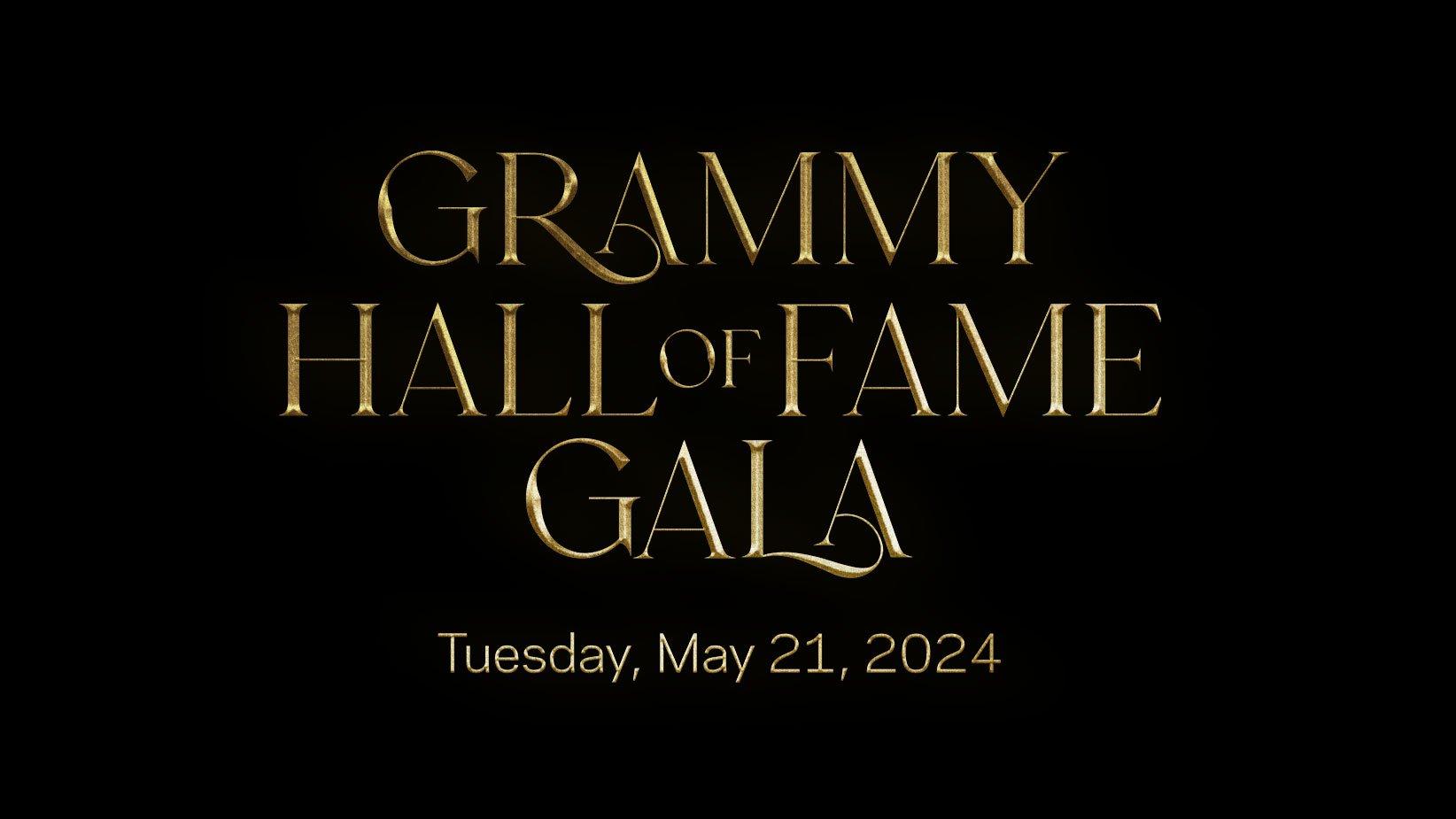
Image courtesy of the GRAMMY Museum
news
The GRAMMY Hall Of Fame Returns To Celebrate 50th Anniversary: Inaugural Gala & Concert Taking Place May 21 In Los Angeles
Following a two-year hiatus, the GRAMMY Hall Of Fame returns to celebrate its 50th anniversary with an inaugural gala and concert on Tuesday, May 21, at the NOVO Theater in Los Angeles. Ten recordings will be newly inducted into the Hall this year.
Following a two-year hiatus, the GRAMMY Museum and Recording Academy are reinstating the GRAMMY Hall Of Fame on its 50th anniversary. The momentous event will be celebrated with an inaugural gala and concert on Tuesday, May 21, at the NOVO Theater in Los Angeles; tickets and performers for the event will be announced at a later date. As part of the return, 10 recordings, including four albums and six singles, will be newly inducted into the GRAMMY Hall Of Fame later this year.
The GRAMMY Hall Of Fame was established by the Recording Academy's National Trustees in 1973 to honor recordings of lasting qualitative or historical significance that are at least 25 years old. Inductees are selected annually by a special member committee of eminent and knowledgeable professionals from all branches of the recording arts with final ratification by the Recording Academy's National Board of Trustees. There are currently 1,152 inducted recordings in the GRAMMY Hall Of Fame. View the full list GRAMMY Hall Of Fame past inductees.
This year, the GRAMMY Museum’s GRAMMY Hall Of Fame Gala will be the first of what will become an annual event, and includes a red carpet and VIP reception on the newly opened Ray Charles Terrace at the GRAMMY Museum, followed by a one-of-a-kind concert at the NOVO Theater in Downtown Los Angeles.
The inaugural gala and concert is produced by longtime executive producer of the GRAMMY Awards, Ken Ehrlich, along with Chantel Sausedo and Ron Basile and will feature musical direction by globally renowned producer and keyboardist Greg Phillinganes. For sponsorship opportunities, reach out to halloffame@grammymuseum.org.
Keep watching this space for more exciting news about the GRAMMY Hall Of Fame!
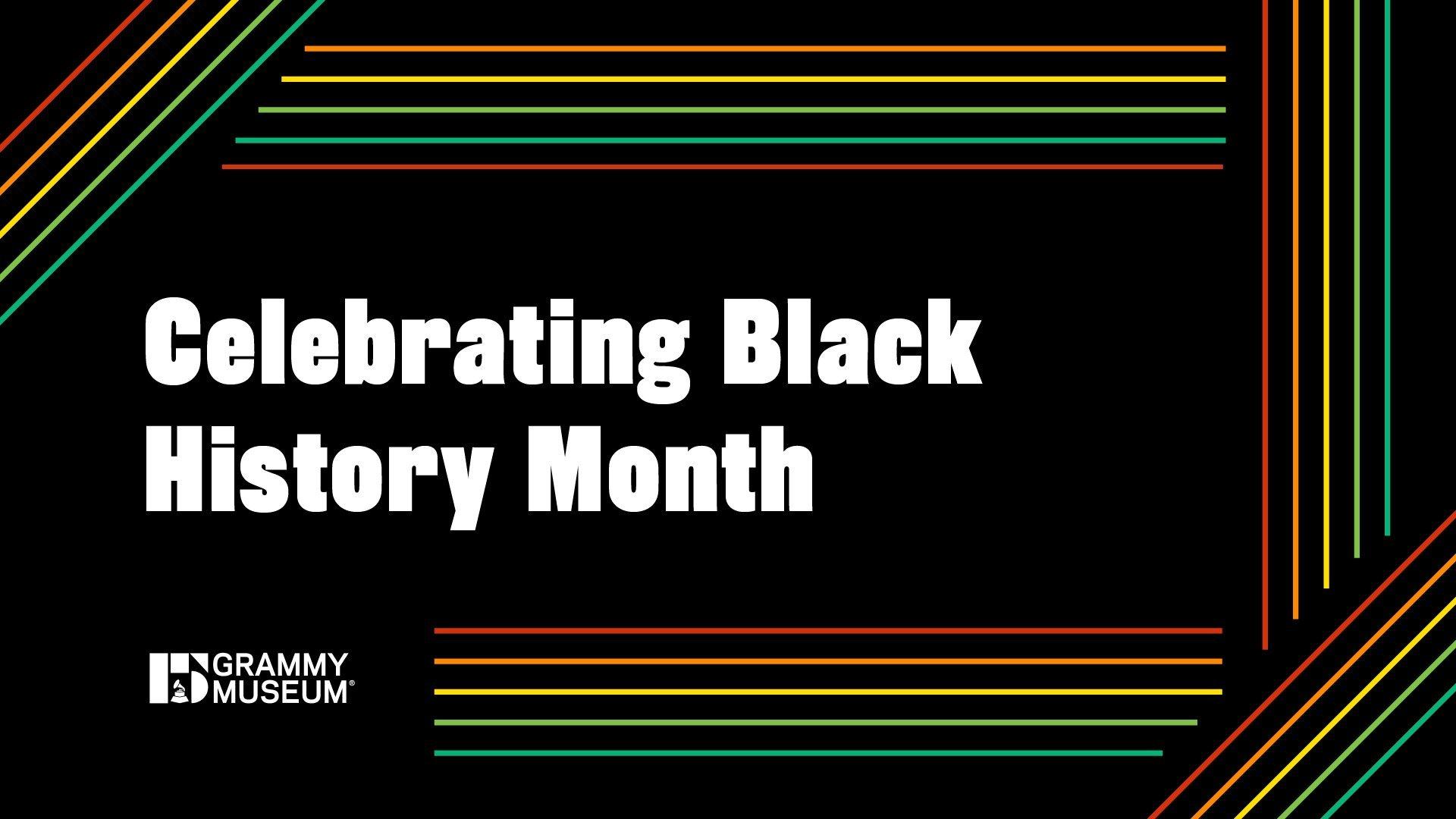
news
The GRAMMY Museum Celebrates Black History Month 2024 With A Series Of Special Programs And Events
Throughout February, the GRAMMY Museum will celebrate the profound legacy and impact of Black music with workshops, screenings, and intimate conversations.
The celebration isn't over after the 2024 GRAMMYs. In recognition of Black History Month, the GRAMMY Museum proudly honors the indelible impact of Black music on America and the fabric of global pop culture.
This programming is a testament to the rich heritage and profound influence of Black artists, whose creativity and resilience have shaped the foundation of American music. Through a series of thoughtfully curated events — including educational workshops, family programs, special screenings, and intimate conversations — the Museum aims to illuminate the vibrant legacy and ongoing evolution of Black music.
From a workshop on the rhythmic storytelling of hip-hop following its 50th anniversary and the soulful echoes of Bill Withers' classics, to the groundbreaking contributions of James Brown and the visionary reimagination of "The Wiz," these GRAMMY Museum programs encapsulate the enduring legacy and dynamic future of Black music.
The GRAMMY Museum invites audiences to delve into the stories, sounds, and souls that have woven Black music into the tapestry of our shared human experience. Through this journey, the Museum and the Recording Academy honor the artists, visionaries, and pioneers whose talents have forever altered the landscape of music and culture.
Read on for additional information on the GRAMMY Museum's month-long tribute that explores, appreciates and celebrates the invaluable contributions of Black music to our world.
Thurs., Feb. 8
History of Hip-Hop Education Workshop
WHAT: In celebration of the 50 years of hip-hop, this workshop examines the unique evolution of Hip Hop from its origin to where the genre is today. Highlighting the golden age of Hip Hop, this lesson will provide students with a greater understanding of the struggles and triumphs of the genre.
WHEN: 11 a.m. – 12:00 p.m.
REGISTER: Click here.
Sat., Feb. 10
Family Time: Grandma’s Hands
WHAT: Join us for a very special family program celebrating the recently released children’s book Grandma’s Hands based on one of Bill Withers’ most beloved songs. Bill’s wife, Marcia, and daughter, Kori, will participate in a book reading, conversation, audience Q&A, and performance, followed by a book signing. The program is free (4 tickets per household.)
WHEN: 11 a.m. – 12:30 p.m.
REGISTER: Click here.
Mon., Feb. 12
Celebrating James Brown: Say It Loud
WHAT: The GRAMMY Museum hosts a special evening on the life and music of the late "Godfather of Soul" James Brown. The program features exclusive clips from A&E's forthcoming documentary James Brown: Say It Loud, produced in association with Polygram Entertainment, Mick Jagger’s Jagged Films and Ahmir “Questlove” Thompson’s Two One Five Entertainment, followed by a conversation with Director Deborah Riley Draper, superstar Producer Jimmy Jam, and some surprises.
WHEN: 7:30 p.m. – 9:00 p.m.
REGISTER: Click here.
Sat., Feb. 17
Backstage Pass: "The Wiz"
WHAT: Presented in partnership with the African American Film Critics Association, join us for an afternoon spotlighting the famed Broadway Musical, "The Wiz," with the producers and creative team responsible for the Broadway bound reboot. The program will feature a lively conversation, followed by an audience Q&A in the Museum’s Clive Davis Theater, and will be hosted by AAFCA President, Gil Robertson, and GRAMMY Museum Education & Community Engagement Manager, Schyler O’Neal. The program is free (four tickets per household).
WHEN: 1 p.m.
REGISTER: Click here.
Thurs., Feb. 22
History of Hip-Hop Education Workshop
WHAT: In celebration of the 50 years of hip-hop, this workshop examines the unique evolution of Hip Hop from its origin to where the genre is today. Highlighting the golden age of Hip Hop, this lesson will provide students with a greater understanding of the struggles and triumphs of the genre.
WHEN: 11 a.m. – 12:00 p.m.
REGISTER: Click here.
Reel To Reel: A Hip Hop Story
WHAT: In conjunction with the GRAMMY Museum's exhibit, Hip-Hop America: The Mixtape Exhibit, the GRAMMY Museum is thrilled to host a special screening of A Hip Hop Story with a post-screening conversation featuring Affion Crockett to follow.
WHEN: 7:00 p.m. – 9:00 p.m.
REGISTER: Click here.
Sun., Feb. 25
Lunar New Year Celebration
WHAT: Join us for a special program celebrating Lunar New Year as we usher in the Year of the Dragon with a performance by the South Coast Chinese Orchestra. The orchestra is from Orange County and uses both traditional Chinese instruments and western string instruments. It is led by Music Director, Jiangli Yu, Conductor, Bin He, and Executive Director, Yulan Chung. The program will take place in the Clive Davis Theater. This program is made possible by the generous support of Preferred Bank. The program is free (four tickets per household).
WHEN: 1:30 p.m.
REGISTER: Click here.
Tues., Feb. 27
A Conversation With Nicole Avant
WHAT: The GRAMMY Museum is thrilled to welcome best-selling author, award-winning film producer, entrepreneur and philanthropist, Ambassador Nicole Avant to the museum’s intimate 200-seat Clive Davis Theater for a conversation moderated by Jimmy Jam about her new memoir Think You’ll Be Happy – Moving Through Grief with Grit, Grace and Gratitude. All ticket buyers will receive a signed copy of the book.
WHEN: 7:30 p.m. – 9:00 p.m.
REGISTER: Click here.
